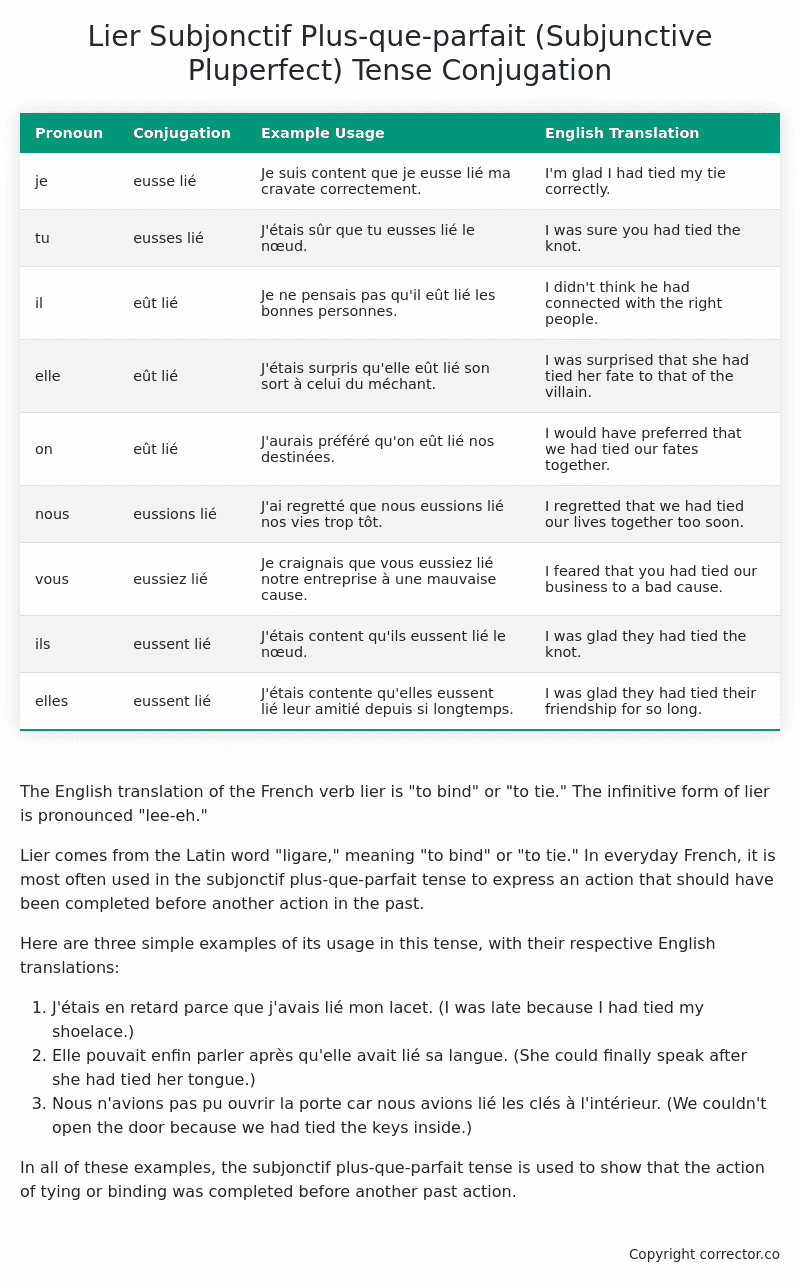Subjonctif Plus-que-parfait (Subjunctive Pluperfect) Tense Conjugation of the French Verb lier
Introduction to the verb lier
The English translation of the French verb lier is “to bind” or “to tie.” The infinitive form of lier is pronounced “lee-eh.”
Lier comes from the Latin word “ligare,” meaning “to bind” or “to tie.” In everyday French, it is most often used in the subjonctif plus-que-parfait tense to express an action that should have been completed before another action in the past.
Here are three simple examples of its usage in this tense, with their respective English translations:
- J’étais en retard parce que j’avais lié mon lacet. (I was late because I had tied my shoelace.)
- Elle pouvait enfin parler après qu’elle avait lié sa langue. (She could finally speak after she had tied her tongue.)
- Nous n’avions pas pu ouvrir la porte car nous avions lié les clés à l’intérieur. (We couldn’t open the door because we had tied the keys inside.)
In all of these examples, the subjonctif plus-que-parfait tense is used to show that the action of tying or binding was completed before another past action.
Table of the Subjonctif Plus-que-parfait (Subjunctive Pluperfect) Tense Conjugation of lier
| Pronoun | Conjugation | Example Usage | English Translation |
|---|---|---|---|
| je | eusse lié | Je suis content que je eusse lié ma cravate correctement. | I’m glad I had tied my tie correctly. |
| tu | eusses lié | J’étais sûr que tu eusses lié le nœud. | I was sure you had tied the knot. |
| il | eût lié | Je ne pensais pas qu’il eût lié les bonnes personnes. | I didn’t think he had connected with the right people. |
| elle | eût lié | J’étais surpris qu’elle eût lié son sort à celui du méchant. | I was surprised that she had tied her fate to that of the villain. |
| on | eût lié | J’aurais préféré qu’on eût lié nos destinées. | I would have preferred that we had tied our fates together. |
| nous | eussions lié | J’ai regretté que nous eussions lié nos vies trop tôt. | I regretted that we had tied our lives together too soon. |
| vous | eussiez lié | Je craignais que vous eussiez lié notre entreprise à une mauvaise cause. | I feared that you had tied our business to a bad cause. |
| ils | eussent lié | J’étais content qu’ils eussent lié le nœud. | I was glad they had tied the knot. |
| elles | eussent lié | J’étais contente qu’elles eussent lié leur amitié depuis si longtemps. | I was glad they had tied their friendship for so long. |
Other Conjugations for Lier.
Le Present (Present Tense) Conjugation of the French Verb lier
Imparfait (Imperfect) Tense Conjugation of the French Verb lier
Passé Simple (Simple Past) Tense Conjugation of the French Verb lier
Passé Composé (Present Perfect) Tense Conjugation of the French Verb lier
Futur Simple (Simple Future) Tense Conjugation of the French Verb lier
Futur Proche (Near Future) Tense Conjugation of the French Verb lier
Plus-que-parfait (Pluperfect) Tense Conjugation of the French Verb lier
Passé Antérieur (Past Anterior) Tense Conjugation of the French Verb lier
Futur Antérieur (Future Anterior) Tense Conjugation of the French Verb lier
Subjonctif Présent (Subjunctive Present) Tense Conjugation of the French Verb lier
Subjonctif Passé (Subjunctive Past) Tense Conjugation of the French Verb lier
Subjonctif Imparfait (Subjunctive Imperfect) Tense Conjugation of the French Verb lier
Subjonctif Plus-que-parfait (Subjunctive Pluperfect) Tense Conjugation of the French Verb lier
Conditionnel Présent (Conditional Present) Tense Conjugation of the French Verb lier
Conditionnel Passé (Conditional Past) Tense Conjugation of the French Verb lier
L’impératif Présent (Imperative Present) Tense Conjugation of the French Verb lier
L’infinitif Présent (Infinitive Present) Tense Conjugation of the French Verb lier
(this article)
Struggling with French verbs or the language in general? Why not use our free French Grammar Checker – no registration required!
Get a FREE Download Study Sheet of this Conjugation 🔥
Simply right click the image below, click “save image” and get your free reference for the lier Subjonctif Plus-que-parfait tense conjugation!

Lier – About the French Subjonctif Plus-que-parfait (Subjunctive Pluperfect) Tense
Formation
Common Everyday Usage Patterns
Hypothetical Situations
Reported Speech
Doubt, Wishes, and Emotions
Interactions with Other Tenses
Present Subjunctive
Imperfect Subjunctive
Conditional
Summary
I hope you enjoyed this article on the verb lier. Still in a learning mood? Check out another TOTALLY random French verb conjugation!


